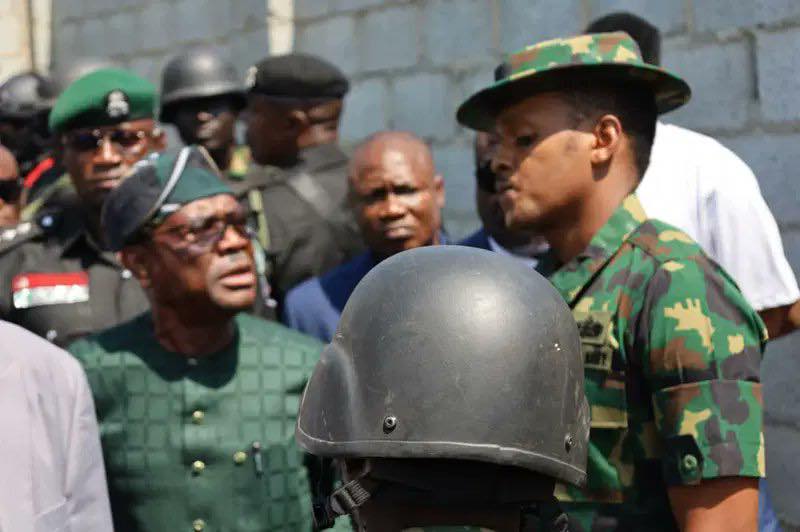There are no products in your shopping cart.
| 0 Items | £0.00 |


Ayo Akinfe
[1] Up until now, Nyesom Wike believed he was untouchable and above the law. It took a young military officer his son’s age to reduce him to size and make the point that Nigeria belongs to all of us, not just the high and mighty
[2] Over the last decade, Wike has acted as Dame Jonathan’s thug, demolished mosques in Rivers State, been a thorn in the side of then Governor Rotimi Amaechi and of late, led to the removal of Governor Siminalayi Wabara. I hope that Lt Yerima’s courageous stance ends this reign of terror
[3] What makes Rivers State unique is that it has always been at the forefront of economic change in Nigeria. Rivers State was the centre of the slave trade, the palm oil trade and now the crude oil trade. It has always been the cash cow of Nigeria. It should account for at least 20% of Nigeria's gross domestic product (GDP) given the head-start it had. Can Wike please back plans by Governor Siminalayi Fubara to achieve this
[4] I am very fascinated with the way Rivers State was more or less a creation of the colonial era. Frederick Lugard for instance built Port Harcourt out of nothing. A derelict and largely uninhabited marsh, all it had then was the Ijaw village Okrika and the migrant Sabon Gari known as Igwe Otcha, made up of Igbo traders who came down the River Nigeria from Onitsha to participate in the palm oil trade. I wonder why Givernor Wike did not create two of three more Port Harcourt's during his tenure
[5] No part of Nigeria prospered from the abolition of the slave trade as much as Rivers State. To fill the void left by the end of slavery, the British turned to palm oil and Rivers became the most economically vibrant part of Nigeria. Around 1900, Nigeria was the world’s largest palm oil producer and Port Harcourt was the port through which most of it was exported. Why did Governor Wike not build processing plants to manufacture finished gods like soap, detergents, engine oil, etc?
[6] Palm oil brought thousands of Igbo traders into modern day Rivers State. For starters, the likes of Jaja of Opobo were Igbo traders and then towns like Bonny sprang up out of nowhere as these migrants founded settlements. Today, the Igbos known as the Ikwerre, are the majority in Rivers State. Odili, Amaechi and Wike are all Ikwerre, which is an Igbo sub-group as far as I am concerned. In my book, an Ikwerre man is just as Igbo as a Wawa or an Ngwa one and their dialect is Igbo through and through. Governor Wike has failed to tap into this entrepreneurial spirit
[7] In 1832, the British began exporting palm kernels from Nigeria and by 1911 British West Africa alone exported 157,000 tonnes of which about 75% came from Nigeria. As recently as the early 1960s, Nigeria’s palm oil production accounted for 43% of the world production. Today, we are actually producing more then we did back then but our output only accounts for 7% of the global total in 2025. Governor Wike did not expand production, opening new plantations, using high-yielding hybrid seedlings but Governor Fubara can, so he should support him in doing so
[8] We no longer dominate the palm oil trade partly because the British never deemed it fit to invest in palm oil plantations in Nigeria. In the 1870s, British administrators took the plant to Malaysia and in 1934 that country surpassed Nigeria as the largest exporter of the product. You know why? The first commercial scale plantation in Malaysia was founded in 1917 and established in Tennamaran Estate in Selangor. How come the British saw it fit to establish a plantation in Malaysia but not in Nigeria? It tells me that the slave trade mentality still prevailed. They deemed us not worthy of serious commercial activity. Governor Wike should have held the British to account over this and forced them to invest in Rivers State rather than go around bullying minnows
[9] As fate would have it, Rivers State also killed the palm oil trade following the discovery of crude oil at Oloibiri in 1956 and the commencement of production in 1958. That year, our first oil field came on stream producing 5,100 barrels per day and since then, we have not thought of anything else. Today, Rivers State is the second largest crude oil producer in Nigeria and has a GDP of about $21bn and a budget of N480bn ($1.3bn). However, it’s internally generated revenue (IGR) is only N61bn ($170m). Now, for me this figure is skewed as under resource control, oil revenue should count as IGR in Niger Delta state’s. Anyway, my point is that Rivers State should have a highly diversified economy
[10] I just have this gut feeling that when Nigeria ends her mad dependence on crude oil, Rivers State will also be at the centre of it. Personally, I take the stance that nothing other than manufacturing will get us out of this morass. Rivers State will be key to that. Just imagine the size of the Nigerian economy if we had shipyards at Port Harcourt, Bonny, Degema, Buguma, Abonema and Opobo building merchant cargo ships, air craft carriers, submarines and naval gunboats? Oya, over to you Nyesom Wike!